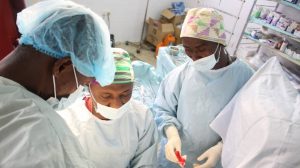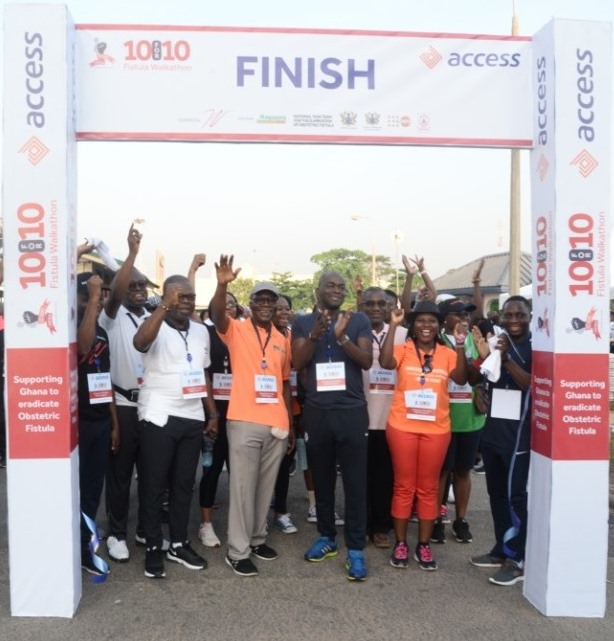A Feature by Christabel Addo
Accra, May 22, GNA – Women go through several life stages, with each phase coming with its own challenges, but while some may enjoy a life free from uncertainties and hardships, others might not be that lucky.
They are often overburdened with socio-cultural expectations of which marriage and childbearing are a paramount prerequisite.
Unfortunately, access to quality healthcare services during pregnancy and postpartum remains a challenge, particularly for those living in remote communities, raising great anxiety and fear of the unknown with Obstetric Fistula (OBF) being one of such dreaded issues.
Obstetric Fistula (OBF) remains one of the most devastating childbirth injuries predominantly found among women and girls living in remote communities without access to emergency obstetric care.
It is a serious medical condition and debilitating childbirth injury resulting from prolonged obstructed labour in the absence of emergency obstetric (medical) care such as a caesarean section (CS) and the delay causes the pressure on the baby’s head, which gets locked up within the birth canal to press against the bladder and rectum, creating an abnormal hole.
Sufferers are left with uncontrollable leakage of urine, faeces or both, and this can destroy a woman’s life due to the physical, social and psychological trauma if not urgently corrected.
PREVALENCE

It is estimated that globally, about 500,000 women and girls are living with fistula with new cases being recorded annually, and Ghana’s statistics reveal a worrying 1,300 annual record of cases, predominantly from the three northern regions (Upper East, Upper West and Northern), as well as the Central and Savannah regions.
OBF can be linked to poverty, lack of, or limited education and access to quality healthcare services.
The World Health Organisation (WHO) therefore aims to eradicate OBF by 2030 and urges countries to accelerate progress towards achieving this goal.
PARTNERSHIPS
Based on the premise the “Partnerships to End Obstetric Fistula in Ghana” (PEFIG), was launched in 2023 to drive a seven-year campaign to end OBF in Ghana by accelerating repairs and reintegration of fistula cases to reduce the prevalence.
It involves a group of organisations committed to mobilising the needed funding by engaging various actors in Government, corporate Ghana, all well-meaning Ghanaians and philanthropies to donate generously to support the cost of surgical repairs for at least 200 women and girls living with fistula annually and ensure their effective reintegration into communities after full recovery.
The partners include Access Bank Ghana, Fidelity Bank, AT (Airtel Tigo), World Food Programme (WFP), the Office of the First Lady, Ministry of Health (MOH), Ghana Health Service (GHS), the Gender Department of the Ministry of Gender, Children and Social Protection (MGCSP), the Media and Communication Advocacy Network (MCAN), and the United Nations Population Fund (UNFPA).
Dr Chris Opoku Fofie, the Deputy Director for Reproductive Health, GHS, in an interview with the Ghana News Agency, said the role of the Service within PEFIG is to provide technical expertise through its medical staff for counselling and the surgeries targeted to initially achieve an estimated 100 cases of OBF repairs annually.

However, locating the cases has been a major difficulty as sufferers often shy away from seeking medical care, hiding their condition from the public due to fear of stigmatisation.
He explains that since majority of women with OBF live in remote communities with limited access to quality healthcare services and transportations reaching out to them becomes very difficult without the support of their communities.
Presently, there are no specific data to show an increase in fistula cases in Ghana, “what pertains is that there is a backlog of unrepaired cases because of the lapses in finding these women on time to access the free services”.
The GHS’s strategy for mobilising the cases has been through its staff at Community-based Health Planning and Services (CHPS) compounds and other volunteers within these localities.
Dr Fofie said in collaboration with the Mercy Women’s Catholic Hospital at Mankessim in the Central Region, 30 women were repaired with an additional 15 cases treated in the Upper West Regional Hospital in 2023.
OBF is a product of abandoned labour and poor access to obstetric care, and the hidden cases cannot be easily identified unless community structures are put in place to help reach out to these women and girls.
PARTNER’S STRATEGY
Mr Olumide Olatunji, the Managing Director, Access Bank, said it was now the time to collaborate with a lot more stakeholders to intensify advocacy against stigma and attract funds to finance more surgeries for affected women and girls.
He said Corporate Social Responsibility (CSR) is an integral part of the Bank’s sustainability strategy and underpins most of its business decisions, cutting across everything it does.
Access Bank is spearheading the fight and involving other key stakeholders to drive its “Fist against Fistula Campaign,” as part of its larger objective to support Ghana in meeting the UN Sustainable Development Goals (SDGs), and in response to the high incidence of fistula cases in the country.
He made a clarion call for more corporate bodies to join in the fight.
Mr David-Akindele Oluwaseun, the Head of Corporate Communications of Access Bank Ghana, said the Bank’s attention was first drawn to the issue of OBF by a customer Mrs Helena Stephens, the Managing Director of Kaysens Group in 2018, with a proposition for funding for surgical repairs for these women.
This led to its collaboration with the Ministry of Health through the Ghana Health Service (GHS) and the United Nations Population Fund which is the UN’s Sexual and Reproductive Health Agency in Ghana, among other partners.
He said the Bank is passionate about women, hence it has through its “W” Initiative (it ensures financial inclusion for women), been championing courses that ensure that women thrive in whatever endeavours they find themselves in, be it in life, education, and business among others.
“We have sustainability-driven as a cardinal principle in our CSR under education, environment, entrepreneurship and health,” he said.
Mr Oluwaseun said in this quest, the Bank’s focus for the past three years has been to intensify its fistula campaign in partnership with MOH, Kaysens Group, Mercy Women’s Catholic Hospital, and National Task Team for Eliminating OBF, the Gender Ministry, and UNFPA with an initial pledge of treating at least 100 fistula patients a year.
He said as part of the campaign a 10-kilometre Walk dubbed “10 for 10” was organised across the country signifying the Bank’s 10th Anniversary celebrations in Ghana, aimed at raising public awareness and education on the condition to avoid stigma against sufferers, but encouraging them to go for treatment.
It was also in furtherance to the Bank’s commitment to securing charitable funds for the National Task Team for the Elimination of Obstetric Fistula, which had been mandated by the Government to oversee and coordinate fistula interventions in the country.
He said the Campaign which has been in phases, has yielded significant funding contributions allowing for the restoration of dignity to nearly 200 patients and making Access Bank the single largest private contributor towards OBF repairs in Ghana.
Mr Oluwaseun said going forward, Access Bank is poised to strengthen awareness creation to help eliminate stigma and intensify its fund-raising efforts and appeals to other corporate institutions to join in mobilising more domestic funds to accelerate progress towards achieving the UN goal of ending OBF by 2030.
Dr Wilfred Ochan, the UNFPA Country Representative, has said the partnership brings a comparative advantage to deliver towards the fistula work in Ghana, applauding each partner for their contribution.
Annually on May 23rd, the world observes the International Day to End Obstetric Fistula, and the 2024 theme “Breaking the Cycle: Preventing Fistula Worldwide,” is a call on all to ensure the elimination of existing inequalities in access to essential healthcare for all, removing all barriers to maternal health and enhancing investment to improve on national strategies towards eliminating fistula especially, among developing countries.
GNA